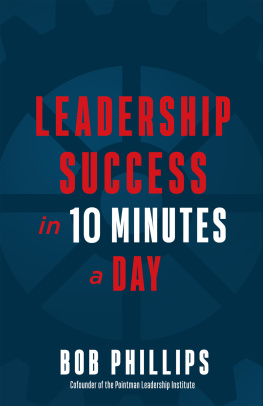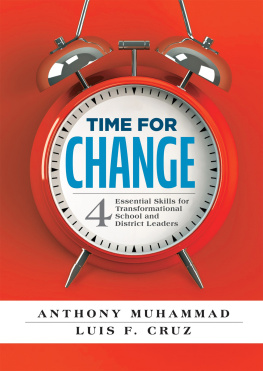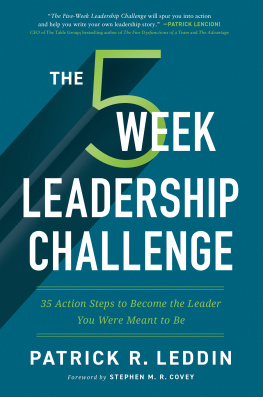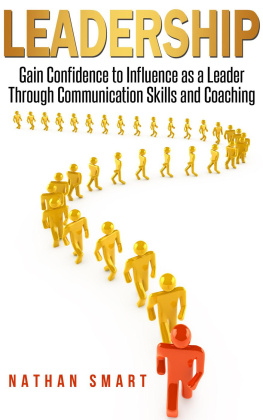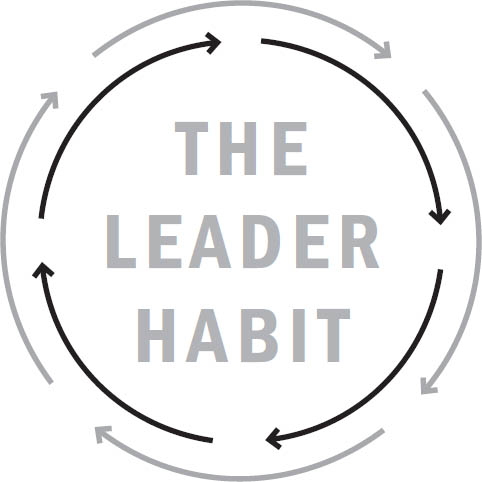Thank you for downloading this AMACOM eBook.
Sign up for our newsletter, AMACOM BookAlert , and receive special offers, access to free samples, and info on the latest new releases from AMACOM, the book publishing division of American Management Association.
To sign up, visit our website: www.amacombooks.org
To learn more about the American Management Association visit: www.amanet.org

The copyright information for this title may be found at the end of this eBook file.
PRAISE FOR
THE LEADER HABIT
In The Leader Habit, Martin Lanik distills the last twenty years of psychological research into an engaging read and a fabulous leadership how to thats peppered with practical tips. Any aspiring leader or coach would benefit from making this book their new reading habit.
KATE BRAVERY,
Global Practices Leader, Talent at Mercer
The Leader Habit provides a clear and engaging set of principles anyone can use to increase their success at work and in life. It shows how to change simple habits in a way that creates significant and lasting improvements. Employees will appreciate how the book demystifies what it takes to go from being an individual contributor to a leader. Managers will value the simple, focused tips for improving leadership effectiveness in their current roles. And human resource experts will appreciate the books foundation on sound, evidence-based practices. In my book Commonsense Talent Management, I discussed how the most powerful achievements are often the result of consistently applying basic and easy-to-understand concepts. The Leader Habit exemplifies this principlesimple is powerful.
STEVEN T. HUNT, Ph.D.
Senior Vice President of Human Capital
Management Research for SAP SuccessFactors

MASTER THE SKILLS YOU NEED TO LEAD

IN JUST MINUTES A DAY
MARTIN LANIK

To everyone who thinks reading this book will improve
your leadership skills.
It will... if you put it into practice.
CONTENTS

Prologue: Lauras Story
Laura, an emergency room nurse at a hospital that hired me to provide leadership training for its employees, had always considered herself to be a good leader. As the best nurse in the ER, she prided herself on leading her patients to better health outcomes, and she frequently acted in an informal leadership capacity for her peers. She believed she would make a great nurse manager, certainly better than most of the military-style dictators she had reported to so far in her career. But Laura kept getting passed over for management positions, and she was frustrated that no one seemed to regard her as a leader. Attending a leadership development program seemed like a good way to prove that she was ready to become a manager, so she signed up for my session. She wasnt sure how much she would actually learnit was corporate training, after allbut she thought the credentials would help her finally get promoted. If not, she planned to quit nursing and become a real estate agent.
What Laura didnt realize was that she had come to resemble the military-style dictators she loathed. Her colleagues saw her as argumentative, sarcastic, always pushing her own agenda, dismissive of others opinions, a poor listener, emotionally volatile, and difficult to managenot the qualities of an effective leader, to say the least.
Laura wasnt consciously choosing to be negative or difficult to work with. She didnt show up for her shifts intending to make sarcastic remarks, fight with coworkers, or get upset and aggressive when people disagreed with hershe was just acting that way without thinking. She had fallen into a pattern of negative behaviors that she repeated automatically. These behaviors had become so ingrained that she wasnt even aware of how she was perceived by her peers and the hospitals leaders. Six years of long hours, high stress, and a combative culture at work had turned Laura into a burned-out, negative personand she didnt even realize it.
Laura arrived for my leadership development program with the same negative attitude. Years of experience with corporate training had taught her to keep her expectations low. She was skeptical that she would learn anything new or become better prepared for a management position, but she was willing to sit through a few days of soft-skills lectures so that she could put Leadership Development Training on her rsum.
When Laura walked into the first session, she was surprised to find that the program wasnt set up like other training programs she had attended. Instead of presenting a series of lectures and workshops, with textbook-style reading materials thrown in for good measure, the program focused on building positive leadership habits through simple, 5-minute daily exercises. Still, Lauras automatic response was sarcasm: So Ill become a better manager by practicing these trivial exercises for five minutes a day? Sure. Whatever you say. It seemed too simplistic and too good to be true, but she decided to go along with it. Okay, Laura thought, lets jump through these hoops and get this over with. Little did she know that she was about to change her life.

The Change Came in Two Months
Laura began her leadership development with a single exercise designed to help her learn to ask open-ended questions: After realizing that you want to ask a question, start it with the words what or how. All she had to do was practice this behavior once per day. Being a competitive, driven individual, she took on the challenge, but she quickly discovered that she didnt have time to stop and consciously think about asking open-ended questions during her hectic workdays in the emergency room. To make sure she didnt forget to practice her exercise, Laura wrote a reminder on her hand each day before starting her shift: Ask what/how questions.
The exercise felt awkward in the beginning, but every day, as Laura practiced asking open-ended questions, she learned something new. She noticed for the first time how diverse the opinions of her colleagues were, and she realized that she enjoyed hearing them. She also realized that her colleagues were much more receptive to what she had to say if she first asked about their perspective before giving her own opinion. She began developing better relationships with everyone in the ER, even colleagues she had struggled to get along with before. With every repetition of the exercise she felt more confident, and she found that her skill at asking open-ended questions was rapidly improving.
Next page

